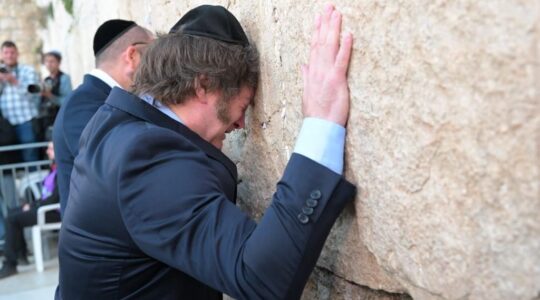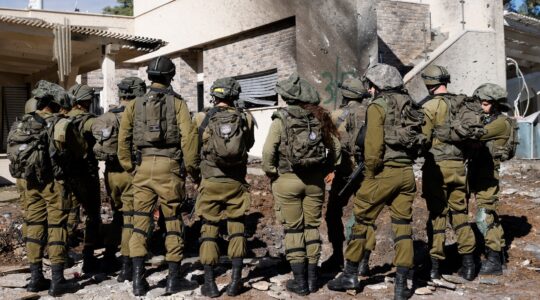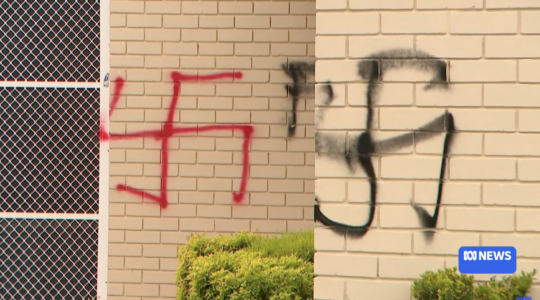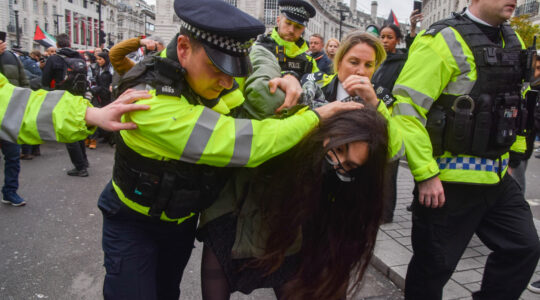
Rabbi Josh Ahrens demonstrating how to put on tefillin during a conversion course at the Sofia JCC in Bulgaria, May 6, 2012. (Dianna Cahn)
SOFIA, Bulgaria (JTA) — As a child, Gabrielle Pavlova pored over pictures of her Jewish paternal grandmother, who died decades before Pavlova was born.
The family had no other tie to Judaism, and Pavlova was fascinated. She delved into her Jewish heritage, read books and, ultimately, wrote her master’s thesis on Polish Jewish literature. Her Jewish roots, she says, were “very close to my heart and soul.”
But technically, Pavlova’s not Jewish, even according to the Reform movement in Europe, where patrilineal descent is not accepted.
At 20, Pavlova asked Bulgaria’s chief rabbi if she could convert. He said there was no such program and she should just go home and study on her own.
Now, 12 years later, she has another option.
Last month, Sofia’s new Orthodox rabbi, Joshua Ahrens of the Sofia Synagogue, launched a religious conversion course in the Bulgarian capital geared toward people like Pavlova.
“What I like about this community is that maybe only a handful of people are observant in an Orthodox way, but so many people are interested in Judaism,” Ahrens said. “They are excited. They want to know more.”
Decades of Communist rule helped wipe out traditional Jewish observance in Bulgaria, but in the 20 years since the fall of the Iron Curtain, Bulgaria’s Sephardic Jews have reemerged as a community. Today an estimated 6,000 to 7,000 Jews, including people like Pavlova, live in Bulgaria — mostly in Sofia, where the Jewish community has 1,000 active members. Though most are thoroughly secular and many do not qualify as Jews according to halachah, or Jewish law, the community organization is officially Orthodox.
That has created an incongruity where people like Pavlova and even Sofia community president Alexander Oscar are not officially recognized as Jews and cannot partake in religious rituals, marry as Jews or read from the Torah.
Ahrens’ new course is a first in that it offers Bulgaria’s “unofficial” Jewish community members a path to official conversion.
“I tell Rav Josh that 12 years is a long time,” Pavlova, 32, said during a conversion seminar in Sofia earlier this month. “For me, the test of time has shown how much I want this. I want it more and more and more.”
It remains an open question whether the graduates of Ahrens’ course, which is in its second month, will be recognized as Jewish by Israel’s Orthodox Chief Rabbinate. But many participants say they’re not converting to earn the right to immigrate to Israel but to be recognized as Jewish within their own community.
“For many it is not important that they are accepted elsewhere,” Ahrens told JTA. “They want to make sure they are accepted here, for Jewish children and to be married and called up to the Torah.”
Oscar says there’s a sense of embarrassment and confusion among young community members when they discover that they are not technically Jews.
“I passed difficult years as a child having to say my mother is not Jewish,” said Oscar, who unable to have a synagogue wedding, married his wife in a Jewish ceremony under a chuppah in a Sofia park with a friend officiating rather than a rabbi. “It falls on the leaders to make sure Jewish children not only feel Jewish but are proud of what they are.”
Post-Communist Europe poses a unique dilemma for Orthodox Judaism, where tradition dictates that outsiders generally should be discouraged from taking on the faith. For half a century Eastern European Jews, who survived attempts at their extermination by the Nazis, lived under Communist regimes that attempted to wipe out religious identity. When they emerged from communism in 1990, Eastern European Jews were cultivated by Diaspora Jews and Israelis who tried to nurture their Jewish identity and helped put Jewish communal structures into place.
Now some Orthodox Jews say global Jewry has a responsibility to help these communities complete their journey of revival by enabling conversions for those members who because of intermarriage by their parents are not halachically Jewish.
“This is a first in Jewish history,” said Ari Greenspan, an American-born Israeli dentist who helped organize the Bulgarian conversion course. “Never before did you have children of Jews not practicing for generations who perceive themselves as Jewish and want to come back to Judaism.”
Greenspan’s inspiration for establishing the conversion course came a few years ago during a Jewish youth conference. When it was time to read from the Torah, Greenspan turned to young community leader Martin Levy to read first.
But Levy said he couldn’t. He wasn’t halachically Jewish.
It wasn’t until Ahrens, a German, was hired by the Sofia Synagogue’s board in late 2011 and began reaching out to introduce the community to religious life that the course took real form. Sponsored by the Jewish community, the course drew about 20 interested people. Ahrens holds one weekly evening class, which is filmed and posted online for people outside Sofia. Once every few months he runs a weekend seminar like the one in early May.
Both Ahrens and Greenspan agree that conversions will have to comply with all Orthodox requirements, including circumcision and ritual immersion in a mikvah.
Some Bulgarians question the necessity of a formal ritual to solidify their identity.
“For me, the exam is not going to make me more Jewish than I am,” said Levy, 24, who grew up in Jewish community programs and is now on the board of directors. Still, Levy said he knows the material and might just take the final exam.
Setting up a beit din — a three-rabbi panel to conduct the final exam for converts — is a particular challenge. Ahrens and Greenspan will have to look outside Bulgaria to find three Orthodox rabbis for the beit din and are waiting until the yearlong course is further along to demonstrate clear commitment by candidates.
Neither has contacted the Israeli Rabbinate, which determines for Israel who is a Jew, because they don’t feel their course would be well received.
Rabbi Seth Farber, founder of the Jerusalem-based ITIM, an organization that helps Israelis navigate issues involving the Chief Rabbinate, argues that the Israeli Rabbinate has a responsibility to help bring Eastern European Jews back into the fold.
“Israel right now is not interested in taking on those kinds of responsibilities,” Farber said. “And I think that is a squandered historic opportunity that is only going to exist for one generation.”
Rabbi Refael Dayan, who is in charge of external conversion issues for the Israeli Rabbinate, said he had not been contacted regarding conversion in Bulgaria.
“Who says they are even Jewish?” Dayan said. “They could be full-fledged gentiles. Someone has to check them.”
In Sofia earlier this month, Tanya Behar scribbled notes furiously during lectures on Jewish signs and symbols. Tanya said she agreed to take the course because her husband, Alberto, a large, boisterous cantor in Plovdiv, just outside Sofia, wanted a ketubah, or Jewish marriage document — and he promised to lose 65 pounds. But she also sees in Judaism a sense of community.
“I want to be part of this Jewish ethic,” she said, “tzedakah, that we are responsible for one another.”
Pavlova is very excited about the conversion course. After years of waiting for an opportunity to convert, she moved from the northern town of Pleven to Sofia two years ago and met a Jewish man. She lights Shabbat candles, bakes challahs and hosts Shabbat meals. She and her partner together read the traveler’s prayer, Tefillat Haderech, when they travel.
Judaism, she said, is at the heart of the couple.
But Pavlova won’t marry or have children until she completes her conversion. Her eyes welled up with tears at the prospect of the beit din. She feels like a runner starting a marathon, she said.
“I know how hard it was to wait 12 years,” Pavlova said. “I wish to give this to my children. I don’t want my children to have to endure this.”
JTA has documented Jewish history in real-time for over a century. Keep our journalism strong by joining us in supporting independent, award-winning reporting.





